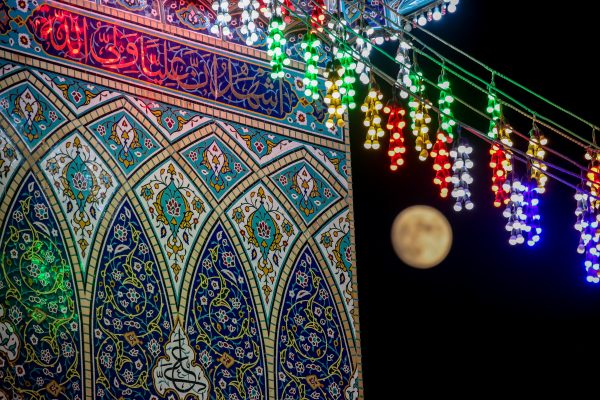How many of these titles did you know were given to Imam Ali?
How many of these titles did you know were given to Imam Ali?
“Indeed, your real helper and friend is only Allah and His Messenger (blessings and peace be upon him), and the believers as well, who persevere in offering Prayer and pay Zakat (the Alms-due), and they are the ones who bow down with extreme submissiveness before the presence of Allah.” (Quran, 5:55)
Imam Ali (a.s) was born on 13 Rajab in 599 AD. He was the son of Hazrat Abu Talib (a.s) and Hazrat Fatima bint Asad (a.s). Imam Ali (a.s) was born in the Holy Kabah. It has been reported that when Imam Ali (a.s) opened his eyes for the first time in this world, he looked at Prophet Muhammad (saw) first. The deep affection between Prophet Muhammad (a.s) and Hazrat Ali (a.s) was immeasurable and profound.
There are numerous hadiths highlighting the virtues of Imam Ali (a.s), and the Holy Prophet (saw) also said, “The Quran is with Ali (a.s), and the truth follows him wherever he is.” (Rabi al-Abraar, volume 1, page 828)
Imam Ali (a.s) holds various titles, reflecting his virtues and significance. Here are just a few:
Amir al-Mu’minin
Imam Ali (a.s) is known as Amir al-Mu’minin, the master of believers.
On the occasion of Ghadeer, Prophet Muhammad (saw) held Imam Ali (a.s)’s hand and said, “He who acknowledges me as his master acknowledges Ali as his master. O Allah! Befriend those who befriend Ali and oppose those who oppose Ali.” (This hadith is found in Tabarani’s al-Mu‘jam-ul-awsat 7:49, 50 #6081 and Haythami’s Majma‘-uz-zawā’id 9:128).
Wali Allah
Imam Ali (a.s) is known as Wali Allah, the friend of Allah.
In the Holy Quran Allah (swt) says:
“Indeed, your real helper and friend is only Allah and His Messenger (blessings and peace be upon him), and the believers as well, who persevere in offering Prayer and pay Zakat (the Alms-due), and they are the ones who bow down with extreme submissiveness before the presence of Allah.” (Quran, 5:55)
This title emphasizes his esteemed position as a pious and devout servant of Allah and his profound spiritual connection and friendship with Allah (swt).
Bab-e-Madina tul Ilm
One of the titles of Imam Ali (a.s) is ‘Bab-e-Madina tul Ilm,’ meaning ‘The Gate of the City of Knowledge.’
The Prophet (s) said: ‘I am the city of knowledge, and Imam ‘Ali is its gate, so whoever wants from the city must take from its gate.’ (Narrated by Imam Tirmidhi in al-Awsat).
Asadullāh
Imam Ali (a.s) earned the title of ‘Asadullāh,’ meaning ‘Lion of Allah,’ due to his remarkable bravery, especially in battles like Badr and Khaybar.
His courageous actions and commitment to justice make him a respected and admired figure.
Abu Turab
It has been narrated that Imam Ali (a.s) was once resting in a mosque, his clothes covered in dust. Upon entering, Prophet Muhammad, expressing love and care, gently wiped the dust from Imam Ali’s back, saying, ‘O Abu Turab (Father of Dust), go and rest.’ (This is narrated in Sahih Muslim Vol. 1)
The title ‘Abu Turab,’ meaning ‘the father of dust,’ originates from this memorable incident and has since become a symbol of their close bond and mutual affection.
Al-Karrar
“Al-Karrar” is an Arabic term that means ‘The Striker’ or ‘The One Who Strikes Repeatedly.’
This title, associated with Imam Ali (a.s), highlights his remarkable valor in battles, symbolizing his ability to repeatedly strike down his enemies with strength and determination.
Al-Murtadha
“Al-Murtadha” meaning “The Chosen One”, is associated with Imam Ali (a.s) in emphasizing his close and pleasing relationship with Allah and the Holy Prophet (saw).
Prophet Muhammad (saw) said to Imam Ali (a.s), ‘You are to me like Haron was to Musa, with the distinction that there is no Prophet after me.’ (Sahih al-Bukhari)
Hazrat Aisha (r.a) also narrated that the Prophet (a.s) said, “Mentioning Ali (a.s) is an act of worship.” (Kanz al-Ummal)
Jabir narrates another Hadith: “Allah Almighty has ordained the lineage of every prophet through his own progeny, and my lineage will continue through Ali ibn Abi Talib (a.s)” (Al-Mu’jam al-Kabeer li al-Tabarani).
Hayder
“Hayder” means ‘Lion’ and is also the title of Imam Ali (a.s). Imam Ali (a.s) is also known as “Hayder e Karar.”
It collectively conveys the meaning of “Lion of the Battle” or “Lion in Battle.” This title emphasizes his bravery and valor in the face of adversity.
Faatheh E Khaybar
The conquest of Khaybar took place in the 7th year of the Islamic calendar (approximately 629 CE) during the time of Prophet Muhammad (saw). Khaybar was a stronghold of the Jewish tribes, and the Muslims, led by Prophet Muhammad (saw) and Imam Ali (a.s), aimed to address the potential threat posed by these tribes.
Imam Ali (a.s) played a crucial role, displaying exceptional bravery. The fortress of Khaybar was known for its formidable defenses, but Imam Ali’s strategic skills and courage were instrumental in overcoming these obstacles.
Marhab, a formidable warrior and a prominent figure in the Battle of Khaybar, was one of the champions defending the Jewish tribe. He gained particular renown for his famous duel with Imam Ali (a.s) during the siege. Imam Ali faced various challenges, especially the renowned duel with Marhab, where his unwavering determination and skill resulted in a decisive victory.
The conquest marked a significant moment in Islamic history, strengthening the position of the Muslim community in the Arabian Peninsula, and Imam Ali’s bravery in Khaybar solidified his reputation as a valiant warrior and a key figure in early Islamic history.
Conclusion
Imam Ali (a.s) is known as ’Muskil Kusha’, which means ‘the Reliever of difficulties,’ and ‘Imam E Mashriq o Magrib’ which means ‘the Imam of the East and West’. He is regarded as a truthful, and generous individual.
After the Prophet Muhammad (saw), Imam Ali (a.s) is considered the most excellent.
Love for Ali (a.s) is a part of faith, and a person who harbors enmity towards him is not a true Muslim.
“Only a believer will love Ali, and only a hypocrite will harbor enmity towards him.” (This hadith is narrated by Sahih Muslim)
Other references to these hadiths are:
Ukhrijahu Muslim fi al-Sahih, Kitab al-Iman, Bab al-Daleel ‘ala anna Hub al-Ansar wa Ali min al-Iman, 1/86, Hadith number: 78, wa Ibn Hibban fi al-Sahih, 15/367, Hadith number: 6924, wa al-Nasai fi al-Sunan al-Kubra, 5/47, Hadith number: 8153, wa Ibn Abi Shaybah fi al-Musannaf, 6/365, Hadith number: 32064, wa Abu Ya’la fi al-Musnad, 1/250, Hadith number: 291, wa al-Bazzar fi al-Musnad, 2/182, Hadith number: 560, wa Ibn Abi ‘Asim fi al-Sunnah, 2/598, Hadith number: 1325.





